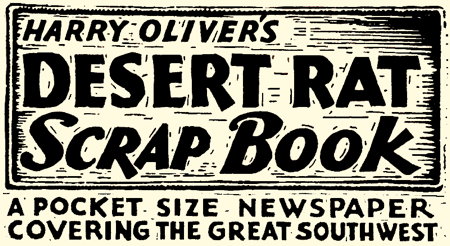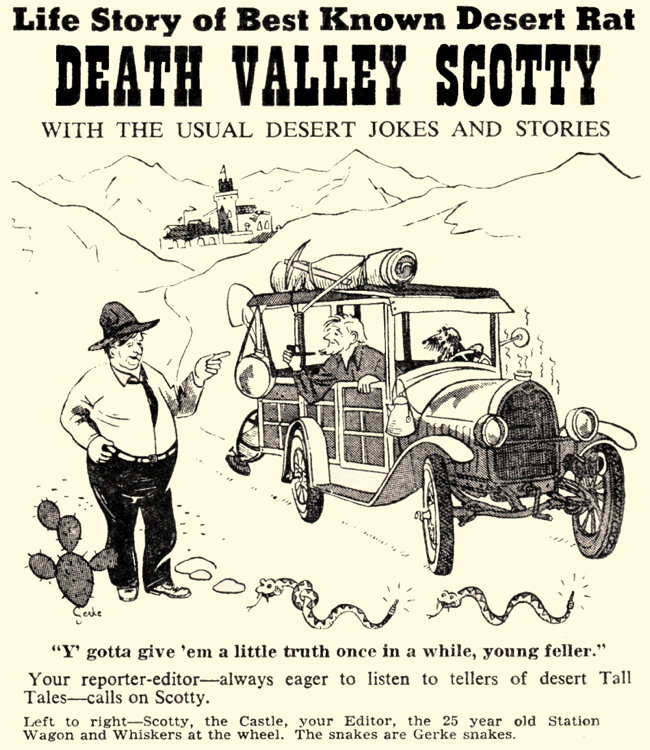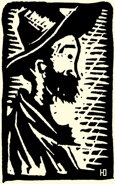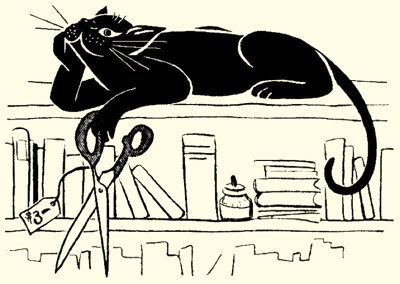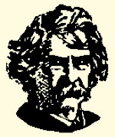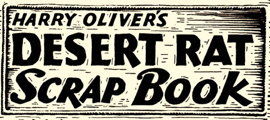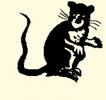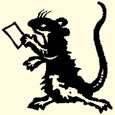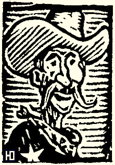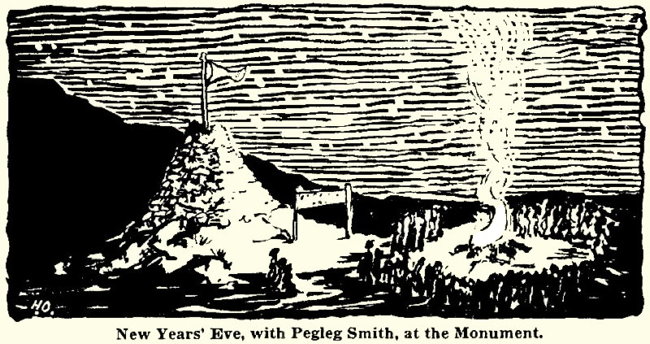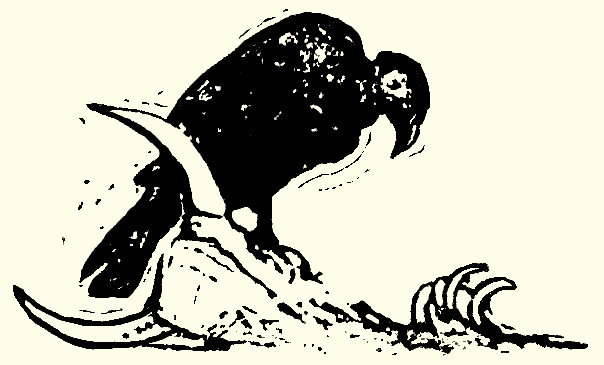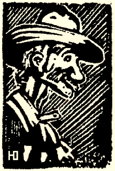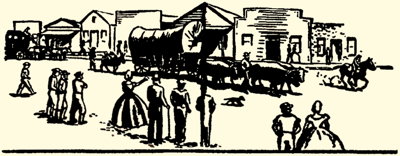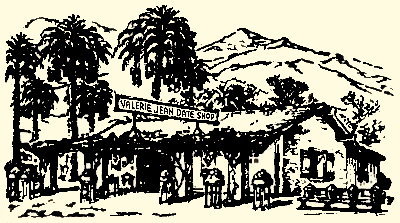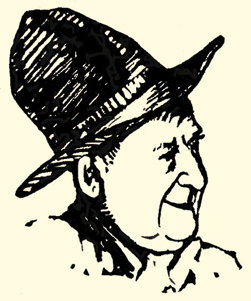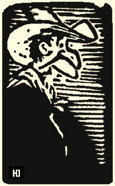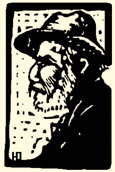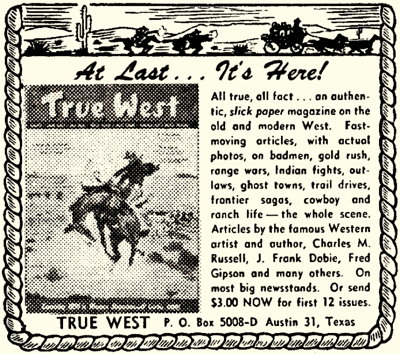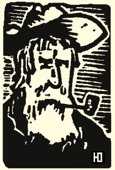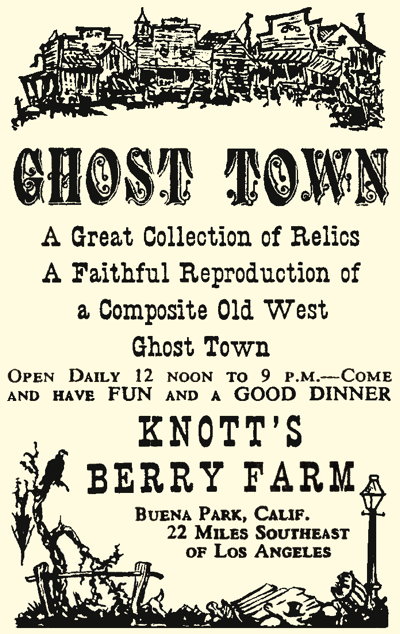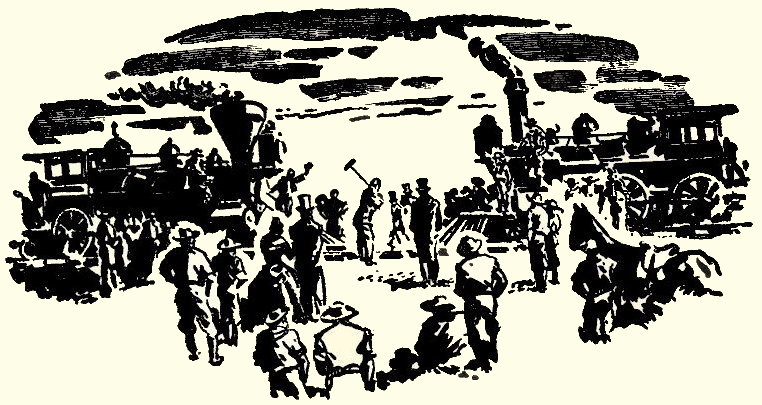BACK HOME COVER THIS IS HISTORICAL INFORMATION ONLY
PRICE 10 CENTS . . . . . . . ONLY ONE LOUSY THIN DIME
PACKET ONE OF POUCH SIX
COOL SUMMER EDITION
PUBLISHED FOUR TIMES A YEAR
ONLY NEWSPAPER IN AMERICA YOU CAN OPEN IN THE WIND
Page 2
Old Adobe Fort Oliver, scarred from earthquakes, bullets, arrows and the elements. Known to have housed outlaws, renegades and ghosts and today the home of a crazy Editor who talks to a weird lot of animals "who talk back."
If you have been in the desert long enough to have become slightly tetched in the head, you'll like this page.
![]()
"Whiskers" my dog don't think it fair that his food is taxed while my own is not.
![]()
Don't call a Desert Rat a liar. If he is a Desert Rat he know he is; and if he isn't a liar, he isn't a Desert Rat.
![]()
The Alcalde's Report to the CACTUS NATION
Old Fort Oliver She Is Haunted
I wrote this last year, when it was 127 in the shade. From Packet One of Pouch Five.
I have had lots of trouble getting this paper out—this Old Fort is hauntd—my daughter Amy says it's me and my friend "I. W. Harper," but I know it's those pesky Pack Rat, Type Lice, Laughing Lizards adn for the last few weeks FLYS.
In other Packets you old time readers have been told of winning battles I had with everything from Varmints to Dust Devils here in this Cactus Nation (this report is for you). • This summer the place is sure rough—I got a rare 100 year old font of type from England with some of those Limey Type Lice in it—and they asked for Scotch Whisky — and me a Bourbon lover. • The Pack Rats have had pups (from the sound at night). • The Flies—I got some new ones—One day I said to Blackie—"I don't like the flies in here,"—so we shoo'ed them all out the front door—and Blackie let in some new ones through the back door, (Blackie likes people too). • By far the worst I have to put up with is the living with this Witch, a green-eyed, she devil, a black cat I call SIN. • We didn't have grasshoppers this spring but the Ants jump farther this summer than I have ever seen them jump before (That is the insects, not the Lady Uncles). • Just one bit of good (hot weather) news, this year I spent $50.00 (of your money, you 7 good people with hundred year subscriptions) and got me a ice cube maker, (no light in it and no handle) but I wish you could see the smile on "I. W. Harper's" face, he almost blew his cork (NOT SO GOOD NEWS) "Whiskers" (my dog) over watered the mint bed. • The 'Singing Sands' this spring sang duets with Jo Stafford, even after I turned off the radio. • The happiest of us all is my Burro she is up in the high Mountains, drinking out of cool mountain creeks, and thanks to a lot of good people it's now against the law for any S.O.B. to shoot her. • 100 year old press is now 101 and that's 30.
Don't Fret Packet
Some times I am too lazy to start an Editorial and some times I get started and I am too lazy to stop—I am a little like "Curly Carroll" of Randsburg, I recall Paul Hubbard telling me how lazy "Curly" was—then much to our surprise we saw "Curly" coming down the hill at a trot—"Look at him"—said Paul—"Too durned lazy to hold back."
These are lazy days—too hot to think—too hot to fret—so I am using my "three-dollar" shears—or I was—where to hell are they—there goes my pen—flew right out of my hand—Sin—damn you Sin—you sinner—you witch—I'll find my shears and I'll fix you—
I'll clip the Riverside Enterprise Story about you—that's it—I mustn't fret—I'll let the subscribers know why we were late with the last mailing—
SIN POSES PROBLEM FOR OLIVER
From Riverside Enterprise
THOUSAND PALMS — Desert Rat Scrap Book subscribers whose names begin with U, V, W, X, Y, Z and letters like that are going to be waiting around awhile for their current issues of "the only newspaper in America that you can open in the wind."
Editor Harry Oliver said today that he's taken care of some of his 20,000 far-fung subscribers, but that Sin in the circulation department now has bottle-necked things.
The circulation department is Oliver, who personally addresses the 20,000 quarterlies that go to every state in the nation and to many foreign subscribers—67 in Australia alone. And "Sin" is a playful black kitten who has fallen into the habit of grabbing the frustrated editor's pen every time he picks it up to address a scrap book.
But Old Fort Oliver's commandant-editor says he's licked many a publishing difficulty during the seven years that he's put out the five-year-old Scrap Book—and that he'll find an answer to this one. (The quarterly Scrap Book notches up a year on its age every time four issues come out. Current one is No. 20, meaning that it's running just two years behind the calendar's reckoning of time.)
![]()
The goat that reeks on yonder hill
Has browsed all day on chlorophyll
—Thanks to Guy Bogart
![]()
LONG MAY THEY WAVE
As this packet goes to press you Editor is helping with the Old Time Mining celebration held EACH YEAR at Randsburg, on Labor Day Weekend. This year my New Show is the First Annual HERMITE CONVENTION, as an opener at Red Mountain. My hope is to glorify the Hermit's Whiskers.
(Being in the Hermit business and having a beard it seems natural that I should—Your Editor)
My Dog Whiskers
The Best Dog I Ever Worked for
CONSPIRACY at FORT OLIVER
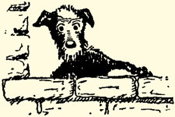
I have courtmartialed "Whiskers" my dog and Dry Camp Blackie. My cat Sin, my Old Crow and thePack Rats are above suspicion, and the Burro is up in the hills. (The Secessionist Flag is at half mast) and there ain't no wind and its 127 in the shade, and there aint no shade.
I caught them redhanded, Blackie has been teaching "Whiskers" to turn somersaults, lay down and roll over, set up on his hind feet and such like. All this I thought O.K. as it gave them something to do this hot weather, staying inside the thick cool walls of Old Adobe Fort like they do.
Then Blackie took to going out nights and taking Whiskers with him. One night I had occasion to go to the local beer hall (I was thirsty) and I caught them in action—smooth as silk was their setup—I stood against the wall to watch. Blackie sat back in a corner. Whiskers would rush to the door and shake hands with all the newcomers. Then Blackie would get up, walk to the center of the barroom lay a coin on Whiskers nose and he'd toss it high in the air and catch it in his mouth and pretend to swallow it. Then the other folks would place more coins on his nose. But you could bet your sweet life he didn't swallow them—he stuck them in one side of his lip and when he got a lip full of money, he'd dash over to Blackie and Blackie makin' like he was asleep with one hand down would take the money out of Whiskers mouth and Whiskers would start the act all over again.
I did not know the Military thing to do to them, the jail dungeon here at the Old Fort has a good lock, but I use it as a wine cellar and Blackie would like that. So we had a long conference and Blackie came up with an idea of appeasement—the idea was that every other night I would take Blackie's place, (great stuff appeasement).
I hope Blakie don't get the idea of making a pick-pocket our of Sin the cat—but then—no, no—not yet—let's see how you people are about sending in your 50c renewals first)
Truth is such a precious article. Let us all economize in its use.
![]()
This is the time of year Desert Ladies elbows begin to look like goats' knees. (Takes just a month of our 121 in the shade to do it.)
Forget your Stomach Ulcers and read this "Don't Fret Edition." Page 3
Smallest newspaper in the world and the only 5 page one.
Packet 1 of Pouch 6
![]()
This paper is not entered as 2nd class mail. It's a first class newspaper.
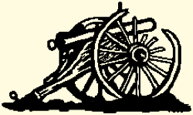
This Paper boasts it contains pure desert RIDICULUM—no other Soap Co can make this claim.
![]()
WHY did the Park Service change the name of the historic "Keys' View" to "Salton View"? We have a dozen Salton Views—but only one Old Timer like "Bill Keys."
It wa on all the MAPS long before the Park Service moved in.
—Your Editor
![]()
Genius is the transcription of hallucination.
![]()
Long before Cortez reached the New World—the Indian children had pull-toys. For centuries their parents never realized the practical application of the wheel for their own adult vehicles.
Stupid you say, yet you and I pushed wheelbarrow past automobile wheels for 40 years before someone put a tire on them. Maybe you didn't, but your editor did.
|
THE MAIL |
Note on returned letter: "Addressee died last year. Left no forwarding address."
Did you ever have any mail returned like this? How about your asbestos edition?
—Bill King
Simplicity is an exact medium between too little and too much.
![]()
Old Station Wagon has a sense of humor, says, Phat Graettinger, Palm Springs Editor . . . I like the story he tells about Blackie. . . . He and Blackie were riding across the desert in Harry's ancient Ford one hot day . . . Blackie was smoking a cigar in a rubber holder . . . He didn't notice that his cigar was getting shorter and shorter and every little while stopped the car to get out and inspect the brakes, engine and so on . . . "Something's getting awfully hot." he told Harry . . . "Can't you smell the burning rubber? We'll never make it.
![]()
A desert river never runs dry. It only runs when there is water in it.
—Geo. A Stingle of South San Gabriel
![]()
It was Abe Martin who said — It's purty hard to be efficient without bein' obnoxious.
![]()
MONTANA
I have another good Swede story that I am sure has not been published in the Rat—
It seems that Ole was a fiddler but he had only on strig on his fiddle. Every evening he played the fiddle for his wife Olga. He never changed the tone or never moved a finger on his left hand on the string. Olga got awfully tired of it so she said to Ole, "I was down town today and saw a fiddler playing. He had four strings on his fiddle and he was moving his fingers up and down on the strings of the fiddle while he played."
Ole said, "Well Olga, I tell you, he was feeling for the spot, I have found it.
—H. W. Larson, Helena, Montana
THE LAST CHIEF OF THE PAIUTES
"TECOPAH"
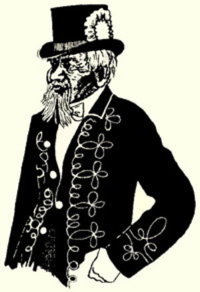 Old Tecopah — I say old because he was old — just wrinkles and squint, was Chief of the Paiutes living in Eastern California North of the Santa Fe Ry., and made his home in Manvel (Barnwell, California).
Old Tecopah — I say old because he was old — just wrinkles and squint, was Chief of the Paiutes living in Eastern California North of the Santa Fe Ry., and made his home in Manvel (Barnwell, California).
We had 3 trains per week on the Ivanpah Branch—which ran from Goff to Ivanpah.
Tecopah was always on hand to meet the trains and had his own little story to tell—something like this—"Me Chief Tecopah—Paiute Indian—my people always friendly white man—many time fight Shoshone Indian to help white man. (Cough Cough Cough) Me 106 years old—Pretty soon die—maybe so you got 'Four-bits'?"
Tecopah always wore a full dress suit—a gift of a Los Angeles Banker, this outfit with his Tall Stovepipe Hat and Rosette, making him a striking figure.
I saw him off on the train in 1903 and was very surprised a week later to see him get off the train with the same old suit—his story of what happened follows:
For many years the Banker used to meet Tecopah in Los Angeles — take him to a Turkish Bath — the barber, shoemaker, gents outfitting shop, hat shop, and, once he was all slicked up, get out his 4-in-hand—take his two beautiful daughters and show off the old Chief to the citizens of the city. On this (his last trip to L. A.) he found the banker had gone to Europe. He called at the Bank and the teller said "Hello Tecopah—how?" (Cough Cough Cough) me fine—got Tuberculosis—where Mr. Ditmann" the Boss is in Europe. "Europe—me no sabe him where bouts?" "About 30 moons East—coming back next Fall"
"Huh—what bout new outfit—suppose you buy?"
"No, I have had no orders to outfit you Tecopah—sorry." Feeling sorry for the old Chief, the teller took $2.50 and slid it across the desk.
"Ugh—heap big 'money store; $2.50—you keep-um." The old man hung about and the teller finally asked the police to come and take care of the Chief for the night. Telling about this Tecopah said.
"Big man—fine blue suit come take me fine big hotel—strong hotel—iron on windows—doors—no body get in—give me fine hot bath—fine room sleep in—plenty fine grub bacon and eggs—potatoes—bread—plenty coffee — 3 times every day—fine big hotel. Put Tecopah on train—no suit—long time Mr. Ditmann no come Los Angeles—Me Old Man—106 Years Old (Cough Cough Cough) Dr. Murphy say Tuberculosis—pretty soon die—Maybe so you got Four-Bits?"
—Thanks to Capt. R. A. Gibson, Palm Springs
Ex-Sheriff Slim Law said, "I'll be 89 tomorrow." he said it to the clergyman, "and I haven't got an enemy in the world."
"That's a beautiful thought" said the churchman.
"Yup," the old timer said, "I've outlived and out shot every damn' one of them.
—Dr. H. W. Kuhm, of Milwaukee
![]()
Your Editor "thinks" he is the first to boast that he rolls his own "King Size" Bull Durham Cigarettes. (Takes two papers.)
![]()
There was once an old cavalry horse which had given good service and was finally retired on a pension. Having nothing to do with his time the horse went to Harvard University Came graduation day and the horse walked up to the platform to receive his diploma On handing him the diploma the president paused to remark: I want to congratulate you. In the entire history of this school you are the first WHOLE horse Harvard ever graduated.
MY TWENTY-FIVE YEARS WITH PEG LEG SMITH
By Harry Oliver, his Press Agent
In the summer of 1932 I was telling Will Roger's of my plan to wake up the Ghost of Peg Leg Smith, we sat on the set of the Motion Picture "Lightning" at Lake Tahoe, Will was the Star, Henry King the diretor and I was the Art Director.
I told him of the giant scrapbook I kept and had for years, and of how I had rewritten the stories many times of this colorful old time Desertteer (1836), giving new versions of his Lost Mine story to the newspapers of the Southwest. How I was a Press Agent for a Ghost.
I was whittling out a peg leg with a sharp knife. At my feet lay 24 more to be shaped, they had been roughly cut to shape on the Studio bandsaw from windfall sugar-pine that had taken on weird patterns due to worm-holes and dry-rot, (a lot of my antiquing was done before I started cutting) I told Will how I would make the newly cut outside look as old as the worms had the holes and then I would plant them in prospect holes in the Borego Hills so they would be found by Pegleg Mine hunters who would then report their find to the newspapers. Thus my client would get much notice, and I would place them so as to help in my plan and steer my Ghost nearer the spot I had already picked for his Monument.
Good old Will Rogers showed interest but not approval.
(I wish I had thought of an answer I gave the press years later.)
(Clipped from The Riverside Enterprise)
Defending himself, Oliver says the Government stocks trout streams for sportsmen, so why shouldn't I stock the desert with Peglegs for fortune hunters?
The first printed word of this "Happy Hoax" appeared in a Randall Henderson Editorial in Desert Magazine of April, 1939.
Back in 1916 the Peg Leg Club was started, DocA. A Beatty was the Boss Tall Tale Teller, Roy Brininger second best, The Kelseys and Jack Dickerson were good too and your Editor just a good listener, those old timers were real Desert men—all deceased, I was very fortunate to have been there to listen.
I know the Ghosts of those old timers join the New Year's fun for whenever a city born legend is told at the Annual New Year's Liars Fete campfire I always look to the night sky to see that the stars cynically wink.
I have just heard from Ed DuVall Old Time Storekeeper of old Time Borego (One R), saying the Old Timers will have the 7th Annual Pegleg Smith Loste Mine Trek and Liars Fete Dec. 31, 1953, to Jan 1, 1954, as usual at the Pegleg Monument.
Ed says, the Judges this year will be Editors of Desert Magazines and Newspapers. So come swap or sell your rocks. Wood, water and camping place for free. Add ten big stones, try early News Year's Day to discover FINDERS GOLD.
You know we are building a monument of loose stones to Pegleg Smith with a big sign near it asserting that every searcher who adds ten stones increases his chances of finding the Pegleg Mine. With the flavor of the Blarney-Stone, this "Wishing Well" idea appeals to all.
OLD TIMERS
TALES OF A PIONEER
Californy's Champion Yarn Spinner of Early Days
from the Pony Express
See ad on page 4
First Native Son
"A storekeeper in San Francisco was sellin' a man a pair of britches and wishin' to be perlite started to ask him questions about himself. 'Did ye come round the Horn?' 'No.,' said the customer. 'Across the Isthmus?' 'No' 'Over the plains?' 'No.' The storekeeper was beginnin' to doubt his own ears. 'No,' said the stranger. 'Well, then, I guess ye haven't got here yet,' said the storekeeper. Ye see, the man was born in Californy."
Pigs Is Pups
"A colored man was sent by his master with two pigs in a bag which he was to take to a neighbor. On the way he stepped in a saloon to get a drink and a joker took out the pigs and put in a brace of pups. Sambo started on his way again and at last come to the man who was to receive the pigs. 'Here's your pigs, boss,' said the darkey, and opening the bag he let out the two pups. 'Why, you damn' numskull, I don't want them pups. Get out of here.' So Sambo started home again with the pups. He stopped again at the the saloon and took another drink. Here the joker made another change and put the pigs back. When the colored man got home he tried to explain what had happened and after he finished he reached into the bag to show the pups. His eyes nearly popped out of his head when he saw the pigs, 'Honest to goodness,' he said, and his eyes rolled, 'them pigs is hoodooed. Sometimes they're pups and sometimes they're pigs.'
![]()
SO THAT'S WHERE THEY GO AFTER GRADUATION
Tourist (in Yellowstone Park):
"Those Indians have a blood-curdling yell."
Guide: "Yes, ma'am; every one of 'em was a college cheer leader.
—Calico Fred
![]()
Editor Ward H. Grant of
THE COACHELLA SUN
Ft. Oliver's commandant, Handsome Harry Oliver, plans to try a different psychology in traffic safety education. When his station wagon gets too old to negotiate dry washes, he's going to spray it pretty with Ghost White paint and mount it on a pedestal beside Speedway 99, topping it with wording something like "The Old Desert Rat drove this for 25 years and never dented a fender. YOU can do it, too!"
Harry's contention is that instead of trying to frighten motorists with slogans like "You May Be Next" they should be encouraged by good examples—like himself.
![]()
WARRIOR'S GRANDSON KILLED
The great-grandson of Sitting Bull, famed Sioux leader, was killed in action with the U. S. Army in Korea. His names was Charles Walking Bull, Jr.
—(AFPS)
![]()
Nothing is so belittling to a man as the infidelity of a homely wife.
![]()
Sign on Indio Theatre—"3-D—Refrigeration and Marilyn Monroe."
![]()
Aid in Shack Life, No. 86
Paint your furniture a light color, makes it easy to see and swat flies.
![]()
It is said that if a prospector spends 10 years at the game, 9 of these are spent looking for his "Jacks" to get going to greener fields. Well this is what happened ast the above The old "Desert Rat" was looking for his Burros. He found them but being naturally cantankerous by nature—they refused to be caught or to be driven toward camp. So in anger, the prospector picked up a rock to try his luck in killing the beast. The rock was very heavy. He took a second look. Yes — he had discovered the famous veins by purest accident—thanks to his Burros.
—Capt. R. A Gibson
![]()
Taken from a patient medicine testimonial: "Since taking your tablets regularly, I am another woman. Needless to say, my husband is delighted."
![]()
Teacher: "Jake, what is a 'tid-bit'?"
Farmer Boy: "I can't define it mam, but I've seen many a calf get heck kicked out of on account of it."
![]()
Cross a she-ass with a stallion and you get a hinny; cross a male ass with a mare and you get a mule; cross a mule and you will get your head kicked off.
—Geo. A. Stingle of South San Gabriel
4 DON'T FRET PACKET
This page is dedicated to the World's Greatest Optimist--the Desert Prospector
Harry Oliver's
DESERT RAT Scrap Book
'MOST TRUTHFUL OF DESERT LIARS'
at Old Adobe Fort Oliver
By L. BURR BELDEN—San Bernardino SUN
Who says the birds are unconcerned over what man does on or to this planet? Not because their migration time has anything to do with an early or late spring, but rather because they were curious over the human migration that packed Washington, D.C., on I-Day, Jan. 20, the yearly advance flight of buzzards returned to Old Ft. Oliver at Thousand Palms on Jan 23 instead of on their traditional Ides of March.
According to Harry Oliver, fort commandant and Desert Rat publisher, one buzzard that looked like a cross between the common desert variety and a parrot wheeled down for an interview (in Spanish) while others in the flight were content to soar overhead. Oliver, who swears he is the most truthful of all desert liars, says the buzzards had a great time watching the inaugural parade and crowds in Washington. Flights of Air Force jets served to keep the birds too high for a close look so curious like they winged out to ask their friend Oliver all about why man was migrating like birds this year.
Coming into California low on the Blythe radio beam, the buzzards saw a line crossing the Chuckawalla Desert that looked to them like Riverside County had been cut in two. That was another question they popped to the Desert Sage.
Now, Oliver hastened to explain for the benefit of those who might disbelieve, he has been on friendly terms with the buzzards for over three years. It all dates back to a summer afternoon in 1949 when Oliver became so engrossed in celebrating Bastile Day he lost both his way and canteen somewhere in the Mojave Desert. Buzzards rescued him from death by leading him to Budweiser Springs (15 miles north of Amboy). In return for the rescue Oliver was made to promise that he would die outside. He secretly believes the buzzards droped in to check on the 1949 promise as they undoubtedly knew of Oliver's recent attempt to find a suitable living cave in Twentynine Palms and were worried.
The birds, Oliver reports, come back to the old adobe fort as regularly as swallows appear at Capistrano. This time Oliver told the curious bird that the line noted crossing the desert was the Southern California Gas Company pipe to bring gas from Texas. The old buzzard, whom oliver insists has a sense of humor well developed, replied, "Harry, that is a great idea. It will take all the gas in Texas to make the smudge pot lighters in Riverside allow you desert folks your own county of Geronimo."
The Thousand Palms publisher modestly disclaims any credit for his remarkable interview. Rather he asserts, the buzzard did the interviewing.
Going from Brawley to Indio the wind was so strong it bent the beam of my head lights back under the car and darned if I didn't have to turn around and back all the way to Indio.
—Sam Bryant, Brawley
A book for a buck
GORDON STUART
has printed a bookIt is just a little book; written by a
human being for human beings to readThe book contains no murder or sex,
Therefore it could not be put out
mass productionTo get the book, send a buck to:
Box 31 Pacific Palisades, Calif.The book isn't funny—
but it's all in fun
Editor's Note—The above was on a card that came in the mail. I remembered the name Gordon Stuart — remembered his colorful Desert Column in Rob Wagner's Script 15 years ago. So I sent him a dollar and asked if I might print 2 of his priceless little yarns and here they are. He is not one to boost but he says, I claim to be the only man in Imperial Valley who ever ate soup in an earthquake; burned a rattlesnake alive; and kicked a jackrabbit while it was running.
![]()
Mule Skinners Wanted
Gordon Stuart
The United Nations isn't doing so good. Neither are labor and management; and congress is deadlocked as usual on most issues. No team work. One time on a construction job doen on the desert a 2000-pound pile driver hammer had to be moved It was down in the sand. Six fine big horses were hitched to the pile driver hammer; but they couldn't move it. The skinner shouted and jerked on the lines; but no two horses pulled alike and the skinner said it couldn't be done. Up came an old skinner with two old hides (horses to you). The skinner hitched the two old hides to the hammer and quietly talked hose talk to the hides and they walked away with the hammer—team work.
It is a great sight to look across two singletrees in line and see the horses laying against their collars pulling in unison with bellies to the ground. That's team work. There are lots of good horses in the world; but few good skinners. The world needs more good mule skinners in high places.
![]()
A desert rat is not a native of the desert and he is not a rat. Botanically speaking he belongs to the horse-chestnut family.
—Geo. A. Stingle of South San Gabriel
GOLDFIELD, NEVADA
Discovered by the laziest man this state ever knew—A "Spring Prospector" (i.e.) one who obtained a "Grubstake" proceeded to a good spring—camped there—ate up his grub and returned with tall tales of how he had followed "float" for months but ran out of grub before he had located the vein. Thus was the reputation of Jim Butler, discoverer of the famous Goldfields. He was in fact returning to Reno to collect another grubstake when he was suddenly enveloped in a blinding dust-storm. He found refuge behind a large quartz outcropping. In the morning—weather again fine, he was looking over the ledge and suddenly saw that it was full of "free gold." He took samples to Reno—sold his interest for a few dollars ,kept gloriously tight for a time and probably wound up as a "Spring Prospector."
This discovery led to many more and Goldfield, Tonopah, Columbia, Rawhide and many others in the neighborhood have produced many many millions.
—Capt. R. A Gibson
VIRGINIA CITY
Seeing the City of Ghosts
"This bed," the Guide confided, "belonged to my own great-grandmother."
"Sure," the unbelieving tourist replied, "no doubt one of the beds General Grant slept in."
"Very likely, sir—though, of course, we could never get great-grandmother to admit it."
![]()
Abe Martin, says—a grouch escapes so many little annoyances that it almost pays to be one.
![]()
These pages are stiffer than the colored pages in Sears Roebuck catalog.
![]()
|
DYNAMOS |
1 manpower |
Gordon Stuart
Heart failure is the greatest killer, and it picks off more men in the top bracket than in the lower brackets. Does that come under the law of compensation? Specialists can't find out what causes so much heart failure.
Down in Poway Valley at the start of the century, we had a one horse gas engine trying to do a three horse job on a pump. The engine just gave up and died—heart failure and frustrations.
A certain man is called a "human dynamo." He goes on the run all day, then goes home and works half the night. Then he can't sleep. A man is only one man power. We often say a man works like a horse but he doesn't. A horse never has to take sleeping pills and he gets his vitamins from chewing grain. The horse eats slowly far into the night and his digestion is good. Sometimes the horse sleeps standing up. Some men can't even sleep lying down. A horse does not worry about what the neighbors think.
Only One World Famous
VALERIE JEAN
DATE SHOP
11 Miles South of Indio on Highway 99
or Please Mail Your Order
1-lb Date and Desert Confections..$1.85
1-lb. NEW "Date Crunchie" Fudge 1.85
3-lbs. 4 Varieties Rare Dates.......... 3.15
Including Delivery — write for Folder
VALERIE JEAN DATE SHOP
Thermal, Calif.
Prospector and Showman
From the book FIGHTING MEN OF THE WEST
By Dane Coolidge
Copyright, by E. P. Dutton & Co, Inc.
Also available in Bantam reprint edition
Death Valley Scotty was two persons, according to where you found him. On the desert he was one of the hardiest of prospectors—a good miner, a wonderful horseman, one of the last of the old Western frontiersmen. He was shrewd, intelligent, the soul of hospitality, a great story-teller and a prince of good fellows. But when in town he was boastful and arrogant; a good fellow still, but full of the flashy wit which he picked up around the Wild West Show.
Millions have seen him when he was riding bronks for Buffalo Bill or when, drunk and boisterous, he threw his money into the streets or squandered it in riotous living. With his big black hat, his blue shirt and red tie, his high boots and long black overcoat he struck them speechless in Los Angeles and New York, in Paris, London and Berlin. He performed before Royalty and consorted with society leaders and millionaires but always with his hat on one side, always swaggering as he played his part.
His greatest pose was the Man of Mystery, the discoverer of the lost Scotty's Mine which has yielded a fortune in gold. With his pockets stuffed full of money he use to love to reel down Main Street, throwing handfuls of change to the gaping newsboys who followed close on his heels. He loved to buy huge automobiles and wreck them the first night, charter special trains and rush across the continent; and if it put his name on the front page of the newspapers he considered the money well spent.
But back in Death Valley, stripped down to two undershirts, flappy pants and hobnailed shoes, Walter Scott was a different man. He was calm and tolerant, a deep thinker, a close observer, requiring only a listener to his tales of far-off lands to make him a regular Sinbad. He liked to tell the gossip of the old Wild West Show—how Queen Victoria became fascinated with Buffalo Bill, the wild romantic scout from the Plains, and attended every performance until the elite crowded the stands—how the King of Spain gave him, Scotty, a cigar, and he nearly got fired when he made the remark that he might give the stump to Bill.
Scotty was a big man, physically, being over six feet tall and weighing two hundred and fifty. He had a high, fighting nose, a shock of bristling hair and blue eyes that lit up with a savage gleam whenever he was opposed. Then his deep resonant voice would rise higher and higher, a voice not unlike a huge mountain bull's as he paws the earth and challenges his enemies. But when his fury subsided the blue eyes would twinkle with humor and the bull voice fall so low that a deaf man could hardly hear it, a hundred yards away.
For months, in those old days, Scott lived alone at his camp in Grapevine Canyon; hiring some renegade Indian or busted-down prospector to hold down the ranch while he was gone. He had five mules so bronco that no other man could handle them, the best outfit that money could buy; and, on the table by his bed in his dilapidated tent-house, he kept four guns piled on top of each other. There was his 30-40 Winchester, his high-powered Newton, his saddle-gun and his sawed-off shotgun; but not a pistol on sight. There was also a hole in the screen of his window where he had taken a shot at an Indian.
His talk was full of stories of treacherous attacks, of spies who dogged his footsteps to discover his hidden mine and mysterious enemies who sought to kill him. He would show the scars, where they had shot him through the arm, the lungs, the leg; and then he would point out where rattlesnakes had bitten him and a hydrophobia skunk had nipped his ear. There was no braggadocio, just the facts of his hard wild life, and every word was convincing. But when he spoke of his hidden mine, all was changed. His eyes gleamed cunningly, he cursed more vehemently as he denounced his unnamed enemies; and to any inquiry as to where his bonanza lay he had one, invariable reply.
"I haven't got any mine. A mine is property—located and recorded. Where I get my metal is Government land, open to anybody. Hop to it, if you think you want it. All you've got to do is find it."
Then his laugh wold turn cynical, with many allusions to "New York 'pothecators"; and, coming nearer home he would say:
"You can't please these folks out here. If you've got money, you stole it; and if you ain't you're a bum."
On the subject of his mine he was at war with all mankind. Some people are crazy over politics or religion. Scotty was locoed over his mine. Keep his mind off of that subject and he was an entertaining companion—get him started and he would reach empyrean heights as he sought new cuss-words to use, after exhausting those of the cow-camp, the circus-tent and the mining-stope. He suspected his best friends, hell afloat and blood on the moon; and when he got down to mining men and their ethics he would back up and start all over again.
"There is honor," he would say, "in every profession except mining. There is honor among thieves and crooks—certain things they won't do to each other; but there is nothing one mining man won't do to another if he catches him asleep at the switch. That's why I'm out to scalp 'em if I can. Every mining magnate in Nevada is a thief. He stole his money from the little men who had mines but no capital to work them. I'm onto their piking system. If you go to their banks to borrow money they haven't got any—there isn't that much money in the world—and then they'll soak you on the interest. But if you come in the same day with money to deposit on interest, they don't want it. Their vaults are stuffed with it—idle! And so they catch 'em coming and going.
The Croesus of Death Valley was a grand denunciator and had a wonderful; flow of language; yet he never went to school a day in his life. Without knowing any school-ma'ams he had an instinctive dislike for them; and at the age of eight, after fighting them off for two years, he ran away to escape them. His father was a distiller and race-horse breeder in Lexington, Kentucky; and Walter got his education talkling to race-track hands and jockeys, and others of the sporting fraternity. He was smart and learned fast and, even at eight, there was nothing of evil unknown to him. At the same time, he learned lots that was good.
But he drew the lines at school. The day before he was to go in and say: "Yes, ma'am," to the teacher, he borrowed fifty dollars from an older brother and took the train for Nevada. He landed at Humboldt Wells in the middle of the night with no one there to meet him and, groping up a back alley, stumbled over two dead men who had been killed in a drunken brawl.
Here was a fine, pious beginning for a young man getting his start—alone in a tough Western cow-town; but he got a job the first thing as a horse-wrangler at $30 a month. Kids were scarce in that country and the cowboys showed their interest in him by giving him lots of bronks to ride. If they didn't kill him they figured it would make a man our of him, and on his first pay day he bought a six-shooter. For two years he stayed on with the Hardesty outfit, learning to ride and rope and shoot. He was a big, husky boy, hot-headed and reckless; and he took to horses naturally, coming as he did from a family of horsemen. His father owned a stable of Kentucky thoroughbreds, and all four of his brothers had drifted west before him and gone to fighting bronks.
But two years was a-plenty to make a man of him, according to his way of thinking, and at the age of eleven he started out to see the world. Taking on as a wrangler and swamper for the cook, he headed for Los Angeles across the desert with a herd of a thousand horses. The cook now became his mentor, filling him up with wise sayings and shrewd advice; and at a town where they stopped to pull off a foot-race he taught him a valuable lesson. The campion of the horse-outfit, though a blow-hard, was a fast runner and all the cowboys bet on him; but before he put down his money Walter sought the advice of Cusi."
"Don't bet on no blankety-blank that can talk," rasped the cook. "This is a foot-race."
Little Walter caught on and bet his roll on the town boy, who beat the bow-legged cowboy, hands down. Scott and the cook had all the money in the outfit, and the blow-hard was in disgrace.
When they got to Los Angeles the price of horses had gone down, and when the boss sold out and quit Scotty was stranded. But on the way down he had passed through Mojave — where the twenty-mule teams left the railroad for Death Valley, to haul out their loads of borax—and he went back and got a job as a swamper. These huge desert wagons had been made to order and the hind wheels stood seven feet high. Each wagon weighed 7800 pounds and carried 22,000 pounds of borax. the twenty mules pulled two of them, besides a water tank and a feed wagon, and Scotty's job was to help the driver.
In the morning the mules, which were always kept haltered, would be led out and hooked up in spans. A long chain was fastened to the lead-wagon and along this the ten double-trees were hooked to the single-trees, and each span was fastened head to head by snaps and straps. Once attached to the long chain they were powerless to get away and stood obediently until all twenty were harnessed. Then the driver mounted his wheeler, gathered up the slack of his long jerk-line, let off the brake and spoke to his leaders. The mules settled into their collars, feeling the load as the chain tightened; until at last with one accord they surged forward and the four wagons rolled away.
Scotty rode on the trail-wagon, to brake down the hills; and on an uphill pull he ran ahead and rocked the mules, or disentangled them when they straddled a tug. Twenty miles a day was the average distance covered and there was a stretch of 90 miles between Mojave and Granite Wells where there wasn't a drop of water. The road was good, being kept in shape by a big gang of Chinamen, and when all went well it took eighteen days for the round trip to the Coleman Borax Works, in Death Valley.
It was in this way, at the age of eleven, that Walter Scott entered the mighty sink from which he gained his name. It is a huge gash between two towering ranges of mountains, a hundred and fifty miles long, ten to twenty miles wide and 276 feet below sea level. From the broad flats of its marshlands hundreds of Chinese scraped up the "snowball" borax, which was worth seventy-five cents a pound; and after loading their wagons he and his driver toiled back across the empty void of the desert.
But after a few trips into the valley a surveying party appeared at Mojave on their way to explore Death Valley and Scotty got a job with them as water-boy. On this trip he fell in with some old-time prospectors who gave him the gold fever for life. After the first chunk of "float" was picked up in the Valley,
Scotty never gave up until he found his mine—or a very good imitation of a mine.
There are those who will swear that Scotty never had a mine, but he must have been crazier than he looked to roam Death Valley for forty years and not pick up some gold. Shorty Harris found four mines in less than forty years, among them the Bull Frog and Harrisburg, and Scott traveled farther and saw more. He chose to be mysterious, keeping his diggings a secret, and he had a rich partner who staked him; but it is reasonable to suppose that, despite his evasive talk, he did discover a very rich mine. No man would squander money the way he did without a color to show for it.
There is no doubt, on the other hand, that his greatest gold mine was Albert M. Johnson of Chicago, a prospector's dream of the ideal grubstaker, a man who blew his money to beat the surtax. He was a tall and genial gentleman, without a care in the world when he escaped to the wilds of Death Valley; and ever since Scotty found him, in 1903, his pockets were lined with gold. They would ride out together over the high and lonely peaks that wall in the Valley on both sides and disappear for months; and when they came back Johnson would be as smiling and mysterious as the Man of Mystery himself. If they had happened to find a million dollar mine it would have meant very little to him, for he had other and surer ways of making a stake; but it pleased him, in a boyish way, to fall in with his partner's showman mood.
It was in 1881 that Scotty saw the first float from the mother lode of his undiscovered mine, but not for twenty years did he trace it to its source and come back with money to burn. With the big survey party there were several old prospectors whose sole purpose was to look out the land. They worked for wages in order to enter a country for which a big outfit was necessary, but whenever they dragged a chain they glanced at every pebble and at last one of them discovered rich float.
(To Be Continued)
DOWN IN COCHISE COUNTY
By George Bideaux
The Dry Lake Dude claims that the cock-eyed cowboy's aim in life is to become a rancher. Up to how he has two heifers and is saving up to make a down payment on a station wagon.
•
DOWN IN BREWERY GULCH
By the Gulcher
"Say, I hear that they're going to have 3 dimensional pictures at the Lyric before long," said the bartender.
"What are 3 dimensional pictures?" asked a long haired stranger "is that something new" I'm from the back woods and I ain't quite up to date, I recon."
I spose you never heard of Marilyn Monroe. the Calendar Girl," said the bartender with a sneer.
"Oh I'm not that far back," said the backwoodsman.
•
Pancho is poor
Like the church mouse
He has no floor
In his 'dobe house
Sometimes the beans
Are hard to get
But he bought
A brand new TV set.
•
"Some people pursue happiness. Others create it."
—Brewery Gulch Gazette
•
Raymond Carlson Editor of the Arizona Highways Tells This One
A young man from the East, who had been working in Wickenburg, decided to leave town. He stole a horse, was arrested a short time later. "Why did you steal the horse?" he was asked. "To get out of town,' 'he replied. When asked why he didn't hitchhike, he exclaimed, "But that's illegal!"
![]()
Only Paper You Can Open in the Wind
Snow Creek Bar, Hwy 99, White Water
Harry Oliver's claim that his "Desert Rat Scrap Book" was the only newspaper in the world that you can open and read in the wind was well proven to me during on of our windstorms just recently. I was tying to read one of the big dailies of Los Angeles in one of our worst desert sand storms, and anyone who knows how it can blow out here will sympathize with me. I had tacked the paper to a board and used wooden strips around the edges to hold it down, which it did, all right, but as I was standing sidewise of the wind, which was coming from my right, I found myself looking at blank sheet, for all the words had been blown right off the page to the left hand edge of the sheet, where they were all jumbled and tangled in an awful mess. As the wind let up they would find their way back on the sheet and I was able to read on for a short spell, but as each gust struck me and swept the words off again I finally gave up in disgust.
Then I remembered having read about Harry's boast, and as I had a copy of his "Packet 1 of Pouch 5" which contained a story of "Old Abe" the mascot of a Wisconsin regiment during the Civil War, I proceeded to read it with interest, as I am from Wisconsin. I became so interested in it that I forgot to notice that with the paper open, it acted as a sail and the wind carried me into the next county, and I had to hike all the way back.
To the average city dweller, these tales may seem far-fetched and stretched a bit, but to the denizens of the desert, who knows of the mysterious happenings and vagaries of the sunny sands, and who knows how to add the right amount of salt with sense, they make an interesting story of things that can, and do, happen.
—SNOW CREEK BERT
![]()
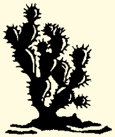
There is an old Mexican Proverb which reads as follows:
"Time was made by God, but hurrying is only the futility of man."
—Eldon J. Cook—Hamilton Air Base
For Tales and Trails of the
Desert West Read the NEWCALICO PRINT
MAGAZINEPublished Every Other Month
Lost Mines, Ghost Towns, Humor, Geology,
Gems, Minerals, History, Folklore, Wildlife of
the Desert WestEdited by Harold and Lucile Weight
29 Palms, California
One Year—$1.50 Single Copy 30c
Jack Bailey was an old prospector around Quartz site in the early days and was a fiend at playing solitaire. Spent most of his time sitting at a table in the old saloon pondering over a game of solitaire and if anyone was so unfortunate as to look over his shoulder he was sure to receive unmentionable insults long to be remembered. Old Jack was the prize grouch when absorbed in his game.
A very English Englishman who was touring the West strolled into the saloon one afternoon and as there was nothing going on around there, he stepped up behind old Jack, adjusted his monocle to watch the play.
Old Jack betan to scrutch around in his chair.
Finally the Englishman tried to open up a conversation and asked old Jack what he did around there. Jack said he was a prospector.
Well, said the Englishman, "I would think you would get lost in this desert old chap."
Jack threw up his hand and leaned back in his chair. "No," he says "No danger of getting lost. I always take a pack of cards with me when I go out in the desert."
"Well," says the Englishman, "what's that for."
"Well, when I get lost I just sit down and start a game of solitaire and in less than five minutes there will be some S.O.B. looking over my shoulder."
The Englishman removing his monocle said "I say old chap my boy, that would be quite a coincidence. Yes quite."
"Well I'll be damned," said old Jack "I give up. Stranger let's have a drink."
—John Herr
I note in your last issue you said you were sixty five and ain't got nothin' and don't want nothin'.
That makes you a Buddhist.
The cornerstone of the old Buddhistic religion is that you increase your happiness as you decrease your wants.—J.H.
![]()
When I play with my cat, who knows whether I do make her more sport than she makes me.
![]()
HOW MINES ARE DISCOVERED
THE GOLD RHODES
Near Needles (in Arizona) Henry Lovin, Sheriff at Kingman, was tired of arresting a Mexican Miner every pay day, so one day he stopped the Miner and said "Pedro you cause me more trouble than all the drunks in this neck of the woods. Here is a grubstake of $100. Now get some grub—get your Burros and get going. Find something and pronto.
Pedro proceeded to buy a case of his favorite Snake Poison, a few Frijoles, bacon, beans and coffee, packed his asses and put Kingman behind him fast. His first camp was alongside the great BLOWOUT of BULL QUARTZ on the old Ft. Mojave road, west of Kingman.
He made camp, got out his first bottle and proceeded to get gloriously drunk. Next morning with a fine hangover, he crawled up on top of the quartz—sat looking back toward Kingman—the while idly striking the rock with his prospectors pick, when suddenly, a piece he had broken off though apparently loose, failed to fall. He pried it loose with his pick. It was full of seams of gold—and thus was found the famous "GOLD RHODES"—which has produced millions of dollars.
It was sold originally for some millions and I presume Pedro died with "the Snakes." Among the snakes — history hasn't mentioned his demise.
—Capt. R. A. Gibson
DEHYDRATED JOKES
From Desert Rat Scrap Book
THE BEST STORIES
OF 50 OLD TIMERSShortened to Shorter Than Short
and Packed into 36 PagesHARRY OLIVER'S
DESERT RAT
JOKE BOOKSend 25c to Harry at Old Fort Oliver
Thousand Palms, CaliforniaTwo for 25c if one is sent to a
G.I. Overseas
LOWDOWN ON WESTERN HISTORY Page 5
This is the "WHY FRET" PACKET—so don't Fret—The picture comes from a mat I stole from "The Desert Sun," Swank Palm Springs Newspaper.
The story from BENETT CERF'S new book "GOOD FOR A LAUGH" ($2.00) Hanover House, Garden City, New York.
After your book dealer gets you this book look on page 189 for two of my yarns.
It was in Utah that the last spike was driven in America's first railroad to the Pacific—at Promotory on May 10, 1869—but history books have spared us some of the less glamorous details. In the first place, the Union Pacific Special from the East was held up by floods and arrived three days late. Chinese laborers on the Central Pacific and the Irishmen who had laid the tracks for the U.P. amused themselves in the interim by taking pot shots at one another. There were some forty casualties, including one innocent bystander from San Francisco. In the second place, the ceremonies dragged on too long; the crowd shivered in an icy wind and drifted away before the climax. In the third place, Governor Leland Stanford of California, chosen to drive the last golden spike (it was removed immediately), lifted his head on the backswing, missed the spike entirely, and fell on his face in the mud. An alert telegrapher, however, simulated the blow with his key, and a waiting multitude on both coasts (including Wall Street) cheered the completion of the first transcontinental railroad span. Luckily for Governor Stanford, television was still eighty years away.
A special three-dollar shears job. —Bennett Cerf
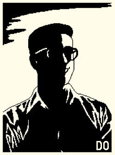
All text was hand-entered (no OCR scans) by Dick Oakes who did the layout, markup and graphics reproduction (all of Harry's misspellings retained). The contents remain the property of Bill Lincoln and his heirs.
